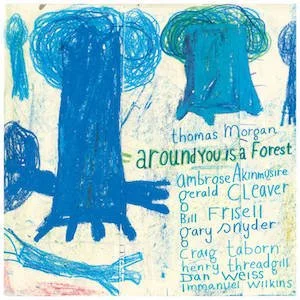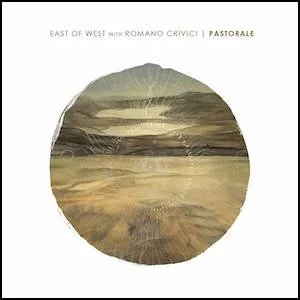Label: Loveland Music, 2025
Personnel - Thomas Morgan: WOODS, bass (#1); Dan Weiss: tabla (#2); Craig Taborn: keys (#3); Gerald Cleaver: drums (#4); Henry Threadgill: flutes (#5); Ambrose akinmusire: trumpet (#6); Bill Frisell: electric and acoustic guitar (#7); Immanuel Wilkins; alto saxophone (#8); Gary Snyder: voice (#9).
The open-minded, in-demand bassist Thomas Morgan takes an unforeseen and ambitious path in his highly conceptual debut as a leader, Around You is a Forest. At once intimate and spellbinding, the album features one solo performance and eight duets with a distinguished lineup of guests. What makes this project so remarkable is Morgan’s invention of WOODS—a programmed virtual string instrument that fuses characteristics of West African lute-harps, Asian zithers, cimbalom, and marimba. He pioneers this technique with sophistication and restraint, providing exotic yet organic foundations that inspire his collaborators to become co-narrators in sound.
The title track opens the album with Morgan alone, offering a breathtaking bass meditation that leads us into a vividly imagined forest. His resonant tone paints an enchanted landscape from which one has no desire to return. “Eddies”, featuring drummer Dan Weiss on tabla, is a rhythmic delight evoking Afrobeat and electronic music; its circular motion mirrors the flow of water around rocks in a stream.
“Dream Sequence”, with keyboardist Craig Taborn, unfolds like an experimental film score, layered in eerie dual-synth polyphony. “In the Dark” welcomes composer Henry Threadgill into a noir-ish soundscape of restless mystery, his flute and bass flute intertwining with Morgan’s textures. The 16-minute “Through the Trees”, with the resourceful drummer Gerald Cleaver adding color and vibration behind the drum kit, explores shifting loops and hazy atmospherics, building from enigmatic reverie to thunderous intensity. On “Murmuration”, saxophonist Immanuel Wilkins floats in and out of focus through eight layered lines above a ngoni-like texture. This is the closest to jazz you can get—even if sometimes it sounds like an off-beat chorale of sorts.
Among the album’s highlights are “Assembly of Beings” and “Rising From the West”. The former, featuring trumpet master Ambrose Akinmusire, enchants with beautifully intoned notes, terse staccatos, and poignant outbursts over a drone-inflected steel-string zither tapestry. The latter, a luminous collaboration with guitarist Bill Frisell, takes us to another dimension within its spacious atmosphere. Melodious guitar fillings are discreetly shaken by electric distortion at some point, in a genuine communion between New York-based musicians who grew up in the West Coast. The album closes gracefully with “Here”, a poetic coda featuring Gary Snyder reciting his own verse in a calm, transfixing voice.
Still absorbing its many layers, I have no doubt Around You is a Forest is the work of a visionary—distinct, immersive, and profoundly original. Each piece feels self-contained yet essential to the whole. Traditionalists may balk, but this may well be the year’s most imaginative and best debut.
Favorite Tracks:
01 - Around You is a Forest ► 04 - Through The Trees ► 06 - Assembly of All Beings ► 07 - Rising From the West




























